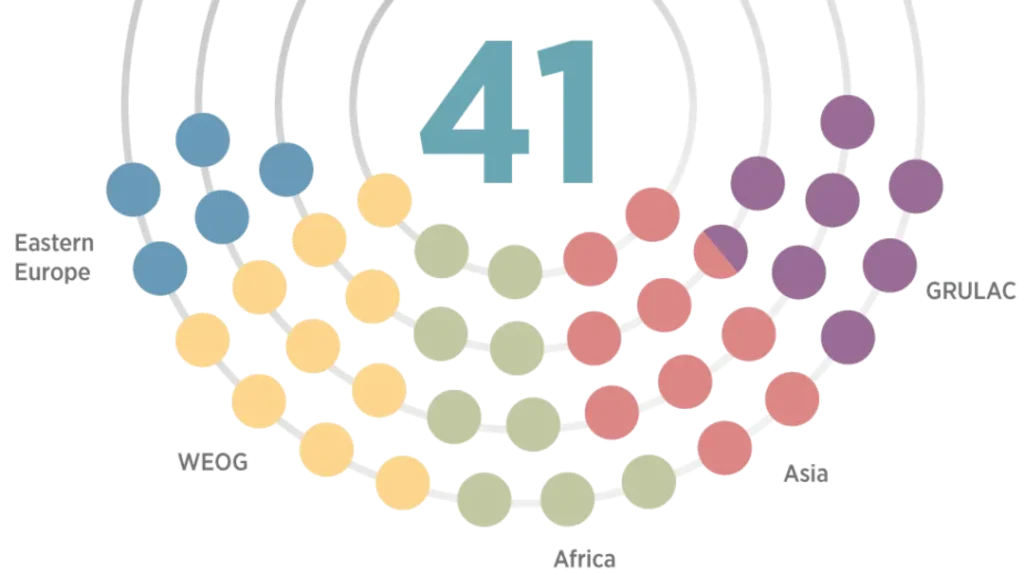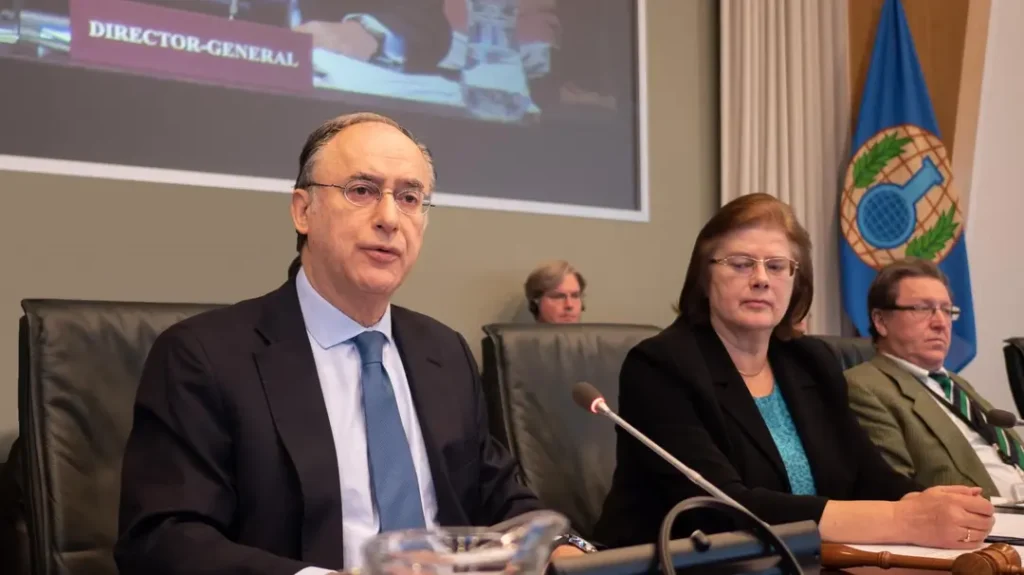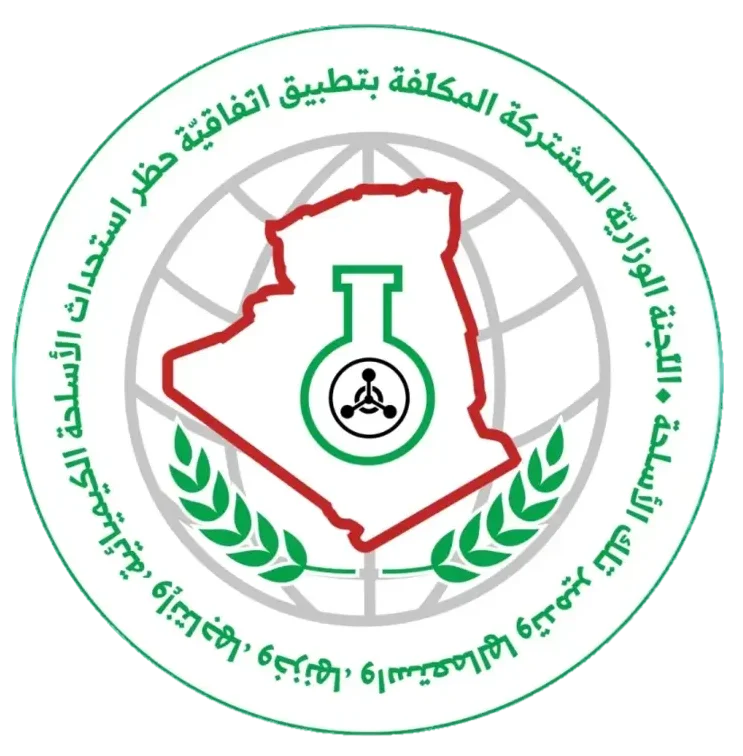Executive Council
The governing body of the OPCW
Executive Council
The governing body of the OPCW
Définir l’orientation stratégique de l’OIAC
41 Member States responsible for promoting the effective implementation of and compliance with the Convention.
In order to ensure the Executive Council’s effectiveness, the Convention requires that the membership is constituted with due regard to the principle of equitable geographical distribution, the importance of chemical industry, and political and security interests. Each Member State has the right, on a rotating basis, to serve on the Executive Council.
The Executive Council consists of 41 OPCW Member States that are elected by the Conference of the States Parties and rotate every two years. The Council supervises the activities of the Technical Secretariat and is responsible for promoting the effective implementation of and compliance with the Convention.


Rules of Procedure
The Council follows clear rules and procedures for how meetings are conducted and how decisions are made.
Principal Functions
The Executive Council is required to carry out all functions and powers entrusted to it by the Convention, as well as any functions delegated to it by the Conference. In so doing, the Executive Council must act in conformity with the recommendations, decisions and guidelines of the Conference, and must ensure their proper and continuous implementation.
Among the most important of the Council’s functions are:
- taking of measures in cases of non-compliance by a State Party, including the submission of recommendations for action to be taken by the Conference;
- considering and submitting to the Conference the draft OPCW programme and budget;
- considering and submitting to the Conference the draft report of the Organisation on the status of implementation of the Convention and the report of the Council on the performance of its activities; and
- making a recommendation to the Conference on the appointment of the Director-General.
Executive Powers
The Council has considerable executive powers in relation to the implementation of the Convention. It may, without reference to the Conference:
- conclude agreements with States Parties on behalf of the Organisation in connection with assistance and protection against chemical weapons;
- approve agreements or arrangements relating to the implementation of verification activities negotiated by the Technical Secretariat with States Parties, such as facility agreements; and,
- subject to prior approval by the Conference, the Council may conclude agreements or arrangements with States and international organisations on behalf of the Organisation.
The Executive Council plays a key role in the resolution of ambiguities and concerns regarding compliance with the Convention. The Executive Council is the primary focal point designated by the Convention for resolving concerns surrounding challenge inspections and investigations of alleged use, including by facilitating consultation and clarification among States Parties.
A special role is also assigned to the Executive Council in relation to requests for assistance and protection against the use or threat of use of chemical weapons, in accordance with Article X of the Convention.
The Executive Council is also assigned powers in the event of a dispute between States Parties relating to the interpretation or application of the Convention.

Decision Making
In practice the Council has generally been guided by the principle of consensus.
In accordance with the Rules of Procedure of the Executive Council adopted by the Conference at its First Session, the Council shall generally take decisions on matters of substance by a two-thirds majority vote, and decide on questions of procedure by a simple majority of all its members. However, a three-quarter majority of the Executive Council is required to stop a challenge inspection from proceeding.
Sessions and Meetings
The Executive Council currently holds three regular sessions annually. Between regular sessions it may also hold special meetings as often as may be required for the fulfilment of its powers and functions.
| Regional Group | Number of Members |
|---|---|
| Africa | 9 |
| Asia | 9 |
| Eastern Europe | 5 |
| Latin America and the Caribbean (Grulac) | 7 |
| Western Europe and Others Group (Weog) | 10 |
| Rotating State Party from Asia or Grulac | 1 |
| Total | 41 |
Composition
12 May 2025 – 11 May 2026
Chairperson
H.E. Ambassador Thomas Schieb
Permanent Representative of Germany
Vice-Chairs
- Morocco (Africa)
- Iran (Islamic Republic of) (Asia)
- Poland (Eastern Europe)
- Chile (GRULAC)
Membership
Africa
- Algeria (2026)
- Angola (2027)
- Cameroon (2027)
- Ghana (2026)
- Morocco (2027)
- Nigeria (2026)
- Rwanda (2027)
- South Africa (2026)
- Sudan (2027)
Asia & Pacific
- Bangladesh (2026)
- China (2027)
- India (2027)
- Iran (2026)
- Japan (2027)
- Malaysia (2026)
- Pakistan (2026)
- Republic of Korea (2027)
- Saudi Arabia (2027)
Eastern Europe
- Czech Republic (2027)
- Lithuania (2026)
- North Macedonia (2027)
- Poland (2026)
- Ukraine (2026)
Latin America & Caribbean
- Argentina (2027)
- Brazil (2027)
- Chile (2026)
- Ecuador (2026)
- El Salvador (2026)
- Guatemala (2026)
- Mexico (2027)
- Panama (2027)
Western Europe & Others
- Belgium (2026)
- Denmark (2026)
- France (2027)
- Germany (2027)
- Greece (2026)
- Italy (2027)
- New Zealand (2026)
- Spain (2026)
- United Kingdom (2027)
- United States (2027)
